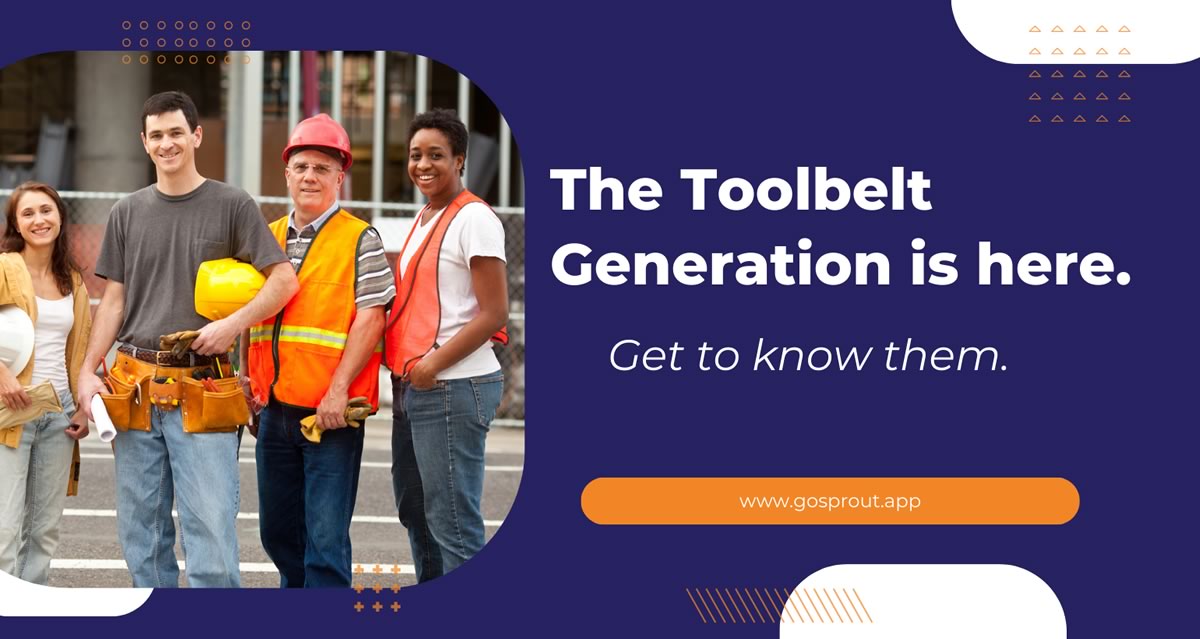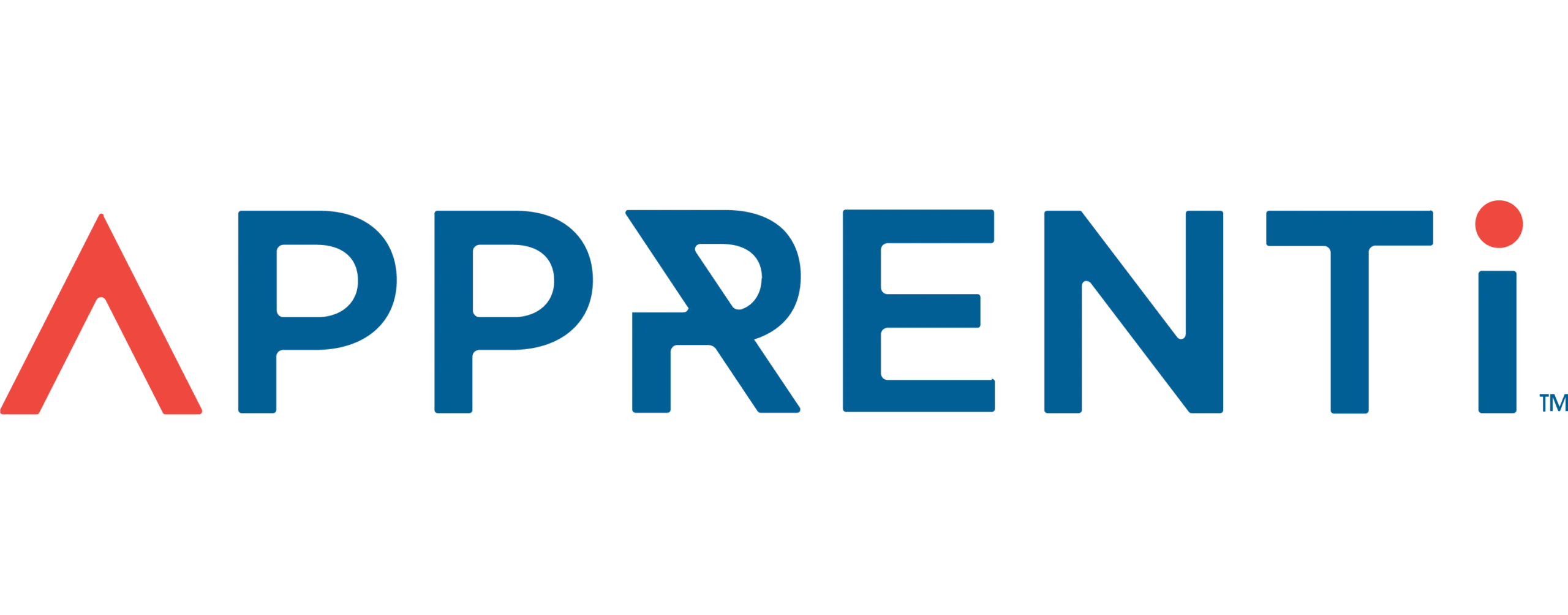Are you already familiar with Gen Z’s new “The Toolbelt Generation” moniker? If your company is in need of Gen Z talent to fill critical roles, then it’s time to get up to speed on how many in Gen Z think differently about higher education.
Many high school graduates already know that being a deskless worker aligns better with their personality. They suffered while sitting at a desk during their secondary education.
Want to Learn More About Your Registered Apprenticeship Opportunities?
BOOK A FREE CONSULTATION
At the same time, our nation’s student debt crisis and even the federal government stepping in to eliminate some of it has put the spotlight on how potentially unsound debt-financed higher education can be, especially for certain liberal arts degrees.
So many students are looking to move directly into what have historically been called “blue collar” jobs and the trend is on the rise with Gen Z.
What Jobs Do the Toolbelt Generation Like?
The opportunity to be outside, on the move, and to get on the job training are big pluses for The Toolbelt Generation.
Many Gen Z workers want to make real money early on in their careers. They aren’t interested in minimum wage work that fits around a traditional college academic schedule.

So they want to get paid a living wage immediately after high school.
Many also want to be outside and moving around the country. Being tied to a desk just doesn’t appeal to many workers.
And what if you can have the above and get training on that specific skillset versus distribution requirements at a traditional college that have very little overlap with what you’ll do in a job.
So The Toolbelt Generation is looking at jobs like solar panel installer, wind industry technician, welding, and HVAC repair and installation, none of which require a college degree. These jobs also have a very quick path to $100k+ annual compensation.
Does the Toolbelt Generation Care About High Wages?
In short, yes, and probably more precisely, they care about having more cash available to fund their interests versus making wages with a high percentage going to student debt payments and even living with parents to keep rent payments down.
The Toolbelt Generation wants to make $100k+ in their early 20’s and not have to use any of it on student debt payments.
As quoted by Windsor Johnston in the NPR article “Many in Gen Z ditch colleges for trade schools. Meet the ‘toolbelt generation’,” Lisa Countryman-Quiroz of Jewish Vocation Service says:
Folks of have really prioritized a college education as a path to the middle class and a path to a cushy office job. But over the last 10 to 15 years, we are seeing a trend among young people opting out of universities. Just the crushing debt of college is becoming a barrier in and of itself.
Are The Toolbelt Generation Entering the Workforce with Student Debt?
The same NPR article quotes Nitzan Pelman of Climb Hire, a company that helps low-income people break into new careers as saying, “It’s not a secret that the cost of college has gone up so dramatically in the last decade that it’s really cost prohibitive at this point.”
So many Gen Z students simply don’t apply for degree programs that will require student debt.
Luckily, the rise of registered apprenticeships that pay living wages while a student both works and attends a college can be the best of all worlds. In particular, Florida’s apprenticeship model is amazing. A student can get free tuition to a public university and get paid living wages for their work within their apprenticeship program.
Why Don’t More Gen Z’ers Take the Toolbelt Path?
Blue collar jobs have a certain stigma. Getting your hands dirty on a daily basis has been seen as perhaps a less desirable occupation than one in which you are expected to wear fancy clothes and work in a gleaming office tower.
Private liberal arts universities have also done an amazing job of branding their programs, even thought their historical track record of graduating students ready for well-paid, in-demand jobs is not that strong. In fact, many of these degrees require a graduate degree in order to unlock wages above $100k/year.
There’s also the problem of relatively few registered apprenticeship programs nationwide. A student who doesn’t already go to a high school with a pre-apprenticeship program or know someone in a registered apprenticeship at a local college may not even be aware of the possibilities.
But with student debt in focus and Depart of Labor and White House initiatives pushing registered apprenticeships as a path to equity, Gen Z is clearly starting to get the message.
With sponsor, employer, and RTI-provider coordination and compliance filing becoming easier with tools like GoSprout’s apprenticeship tracking software, we only see more and more Gen Z taking the toolbelt path year on year.
Is The Toolbelt Generation Future Proofing Against AI?
The likelihood that AI disintermediates all kinds of companies and the jobs that power them is not in question. Mostly the question is how fast to does AI become high enough quality that its output can be considered reliable.
Driving, data interpretation, research, and various types of writing will be in far less demand shortly.
But The Toolbelt Generation recognizes that being able to do complex manual labor is much more likely to remain in demand for a whole career. In fact, AI is helping these types of jobs by allowing workers to bring guide books with them to the tops of wind turbines and power poles, etc. via smart goggles and voice recognition.

How Can an Employer Be Toolbelt Generation Friendly?
Recognizing that more and more quality candidates will not be going the traditional college route, wise employers should look to meet these people earlier in their education.
Forming a registered apprenticeship program in partnership with a local community college is the first step. If you need help in talking through the steps or connecting with the right partners, schedule a free consultation with GoSprout.
But then take it a step further and work with the local high school system to offer a preapprenticeship program in the local community. You’ll be able to show the most motivated students how your business works and allow them to get to know your team and the culture. They can start building skills and job readiness in high school, transition seamlessly to a registered apprenticeship upon high school graduation, and then have literally years of job-specific experience when they officially enter the workforce (in a job that your business needs filled).
That’s a powerful formula! If you haven’t already, book some time with us, and we’ll be happy to talk you through how we can make launching your apprenticeship program and managing compliance a lot simpler than you think.















